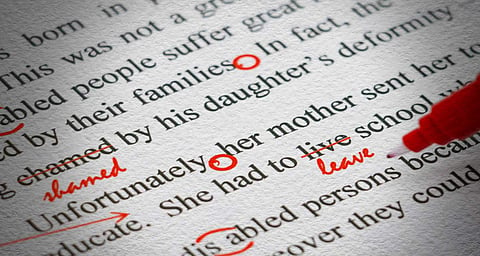

I am a teacher in a CBSE school. I don’t have a degree in English but I teach English. I would like to know the difference between a grammatical error and a usage error? Could you please explain it with a few examples? I also would like to know whether it is possible for someone to learn English without learning the grammar of the language. This query was sent by a reader in Kochi.
Let me answer the second question first. There are many speakers of English who do not know anything about English grammar, but they speak English competently. A few months ago, I met a middle-aged woman who spoke English fluently and competently. She said she was a college dropout. Out of curiosity, when I asked her how she learnt English, she said that it was by exposing herself to the language constantly. I asked her whether she loved learning English grammar and whether any grammar book was her favourite. She replied in the negative. “I hate learning grammar. I did not enjoy grammar classes at school. I never felt the need for buying a grammar book.”
Yes, it is possible to learn any language without learning the grammar of the language explicitly. In the case of the woman in the story, it was her interest and involvement that made her master the language. She learnt the grammar of English implicitly. I have heard many drivers speak English. Did they learn the language in a formal way as many learners do? No. Then how is it possible for them to speak fluently and accurately (most of the time)? It is because they had interest in speaking in English and practising it regularly.
Grammar is a set of rules that are essential to make meaningful utterances. Those who have not learnt grammar of a language explicitly and yet speak the language competently do have the knowledge of grammar, but lack knowledge about the grammar of the language. For example, they may not be able to define grammatical terms such as ‘adjective’, ‘adverb’, ‘phrase’ and ‘clause’ but they know how to use adjectives and adverbs correctly in sentences to make their utterances meaningful.
When it comes to the teaching of grammar, teachers who teach grammar explicitly focus on rule-governed drilling and memorisation, whereas teachers who teach grammar implicitly focus more on fluency than on accuracy and involve students in communicative learning activities. Implicit grammar instruction enables learners to learn the language naturally and become independent learners.
What is usage? According to Merriam-Websters Dictionary, usage refers to “the way in which words and phrases are actually used (as in a particular form or sense) in a language community”. The common collocations of the word ‘usage’ are: casual/popular/common usage, British/American usage, formal/informal usage, modern/current usage, a usage manual/guide/dictionary.
Let’s take the word ‘thank’. What is the difference between ‘thank you’, ‘thanks’ and ‘many thanks’? When we thank someone we use one of these expressions. These expressions differ in style. ‘Thank you’ is formal, whereas ‘thanks’ is informal. When we use ‘many thanks’ in our emails or letters, we convey the message that we are closer to the persons to whom we have addressed the communication. In other words, it embodies warmer feelings than ‘thank you’ and ‘thanks’.
What is the difference between a grammatical error and a usage error? If we violate a common or generalisable rule and produce a sentence that is socially not acceptable, then it is a grammatical error. Usage errors are instances of faulty or unconventional usage and they are not impediments to effective communication.
Learners of English will find the books, Modern American Usage by Garner and Practical English Usage by Swan very useful.
( Albert P Rayan is an ELT resource person and a Professor of English )
